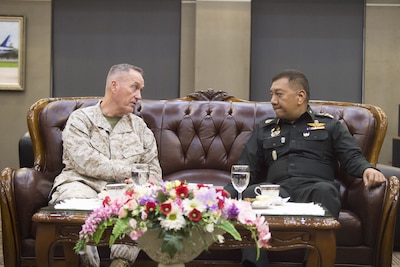By Jim Garamone DoD News, Defense Media Activity
BANGKOK, Feb. 6, 2018 — The chairman of the Joint Chiefs of
Staff will seek to expand military-to-military contacts with Thailand when he
meets with the nation’s chief of defense, the defense minister and the prime
minister here tomorrow.
The United States put a hold on military-to-military
contacts with Thailand following a military coup in May 2014. The contacts have
been re-energized now that the Thai government has scheduled free elections
later this year.
During his visit to Thailand, Marine Corps Gen. Joe Dunford
will meet with Thailand’s chief of defense, Gen. Tarnchaiyan Srisuwan, Defense
Minister Prawit Wongsuwan and Prime Minister Prayuth Chan-ocha.
Advancing U.S.-Thailand Military-to-Military Relations
“My primary purpose to come here is to develop a personal
relationship with the chief of defense,” Dunford said. “It is to continue to
foster strong military-to-military relationships and, in this case, … not only
advance our military relationship, but establish a personal relationship with
him, too.”
Relations between the United States and the Kingdom of Siam
began in 1818. Thailand is one of five treaty allies of the United States in
the Pacific; the others are Australia, South Korea, Japan and the Philippines.
“It is important to maintain relations with Thailand,
because they have outstanding visibility in the maritime domain in a critical
part of the world,” Dunford said. “They have been a good partner overall, and …
our strength globally and particularly in the Pacific is our network of allies
and partners.”
Military-to-military relations form an important aspect of
America’s relationship with other nations, the chairman said, and not just with
allies and partners.
“I should have military-to-military relations with everybody
from a treaty ally [like Thailand] to a potential adversary,” Dunford said.
“Now, the reason I have military-to-military relations with an ally is to
develop interoperability and to be prepared to fight together should that be
required. The reason I have military relations with a potential adversary is to
mitigate the risk of miscalculation and make sure we have open lines of
communication in case we have a crisis.
“And then, where we are with countries that fall in between
those two extremes,” he added, “the character of the military relationship … is
a reflection of the relationship politically between our two countries.”

No comments:
Post a Comment